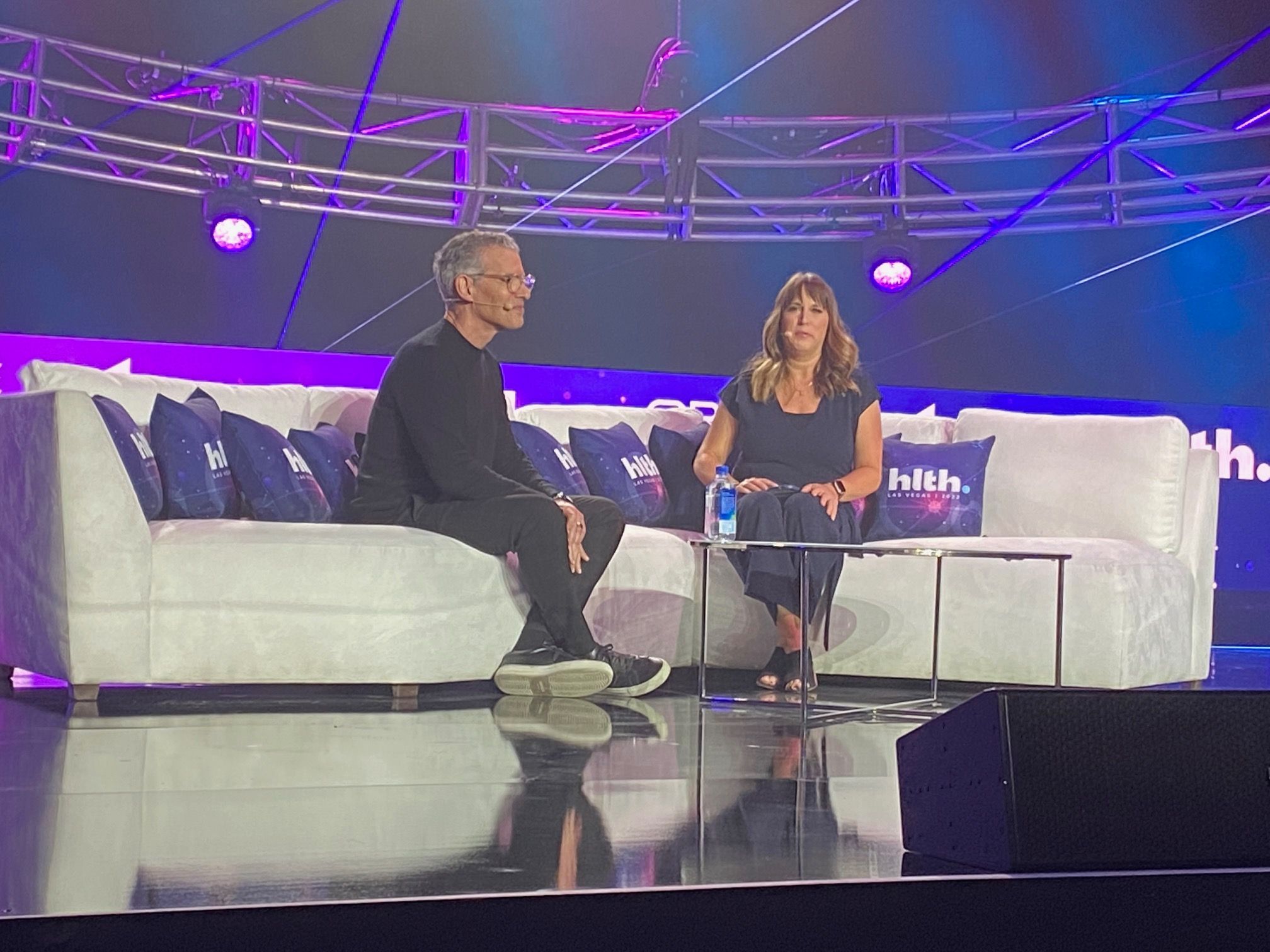Oracle is ‘jumping in the water’ in healthcare | HLTH Conference
David Feinberg, chairman of Oracle Health, talked about Oracle’s acquisition of Cerner, the need to fix electronic health records and transforming the industry.
David Feinberg, chairman of Oracle Health, talks with Heather Landi, senior editor of Fierce Healthcare, during the HLTH Conference, Wednesday, Nov. 16. (Photo: Ron Southwick)

Las Vegas - David Feinberg proudly talked about how Oracle Cerner is the global market share leader in electronic health records, but he’s not exactly bragging when he described the EHR.
Even before Oracle completed its $28 billion acquisition of Cerner in June, he said, “we were really clear that our number one goal was to fix the EHR.”
“They are clunky, non-intuitive and don’t help clinicians,” Feinberg, the chairman of Oracle Health, said of electronic health records.
Speaking at the HLTH Conference Wednesday, Feinberg talked about how Oracle’s acquisition of Cerner is going to accelerate the transformation of electronic health records. Feinberg had been CEO of Cerner before the acquisition.
“We’ve got to make the EHR usable,” Feinberg said. “We can’t have people burning out and quitting medicine because it’s too hard to use.”
He also told the health and tech leaders gathered at the conference that Oracle has made healthcare its top priority.
“In the next couple of years, it’s going to be easier to find information, find that needle in a haystack, and help the patient,” Feinberg said.
Other tech companies have tried to transform the healthcare industry before and crashed and burned. “There’s a lot of stories of tech companies failing in healthcare,” Feinberg said.
Feinberg said many of the failures of previous tech efforts were focused on just one aspect of healthcare.
“What Oracle is saying now is the way we’re going to do this different is we’re going to take the whole thing on,” Feinberg said.
Oracle is looking at a platform that utilizes electronic health records and improves everything from claims processing to managing the supply chain, Feinberg said.
Oracle Chairman Larry Ellison has said he wants to develop a national electronic health database.
Feinberg reiterated Ellison’s commitment to changing healthcare. He said Ellison spoke at a recent event in Las Vegas and used 48 slides in his keynote address, with 42 focused on health
“He has said very clearly that the mission of Oracle is health,” Feinberg said. “This is a huge shift and focus.”
“This is Oracle jumping in the water,” he said.
While Oracle has big ambitions in transforming healthcare, Feinberg said the company isn’t going at it alone. Oracle is teaming up with others in the private sector.
“I want to emphasize We’re doing this with everyone else,” Feinberg said.
In a conversation with Heather Landi, senior editor of Fierce Healthcare, Feinberg said the merger of the two companies has him feeling optimistic about the future. As Oracle acquired Cerner, Feinberg acknowledged being “a little skeptical or apprehensive.”
“Tech companies think those of us in healthcare are a little stupid,” he said.
But Feinberg said the culture of the organizations have meshed well. He also spoke effusively about the Oracle team, calling his new colleagues “incredibly humble and inquisitive.” Oracle has viewed it as a marriage of a company with deep healthcare experience combined with Oracle’s success in other industries. Feinberg also noted that two-thirds of Oracle’s workforce are with the company through acquisition.
“I’m wildly optimistic that this is going incredibly well,” Feinberg said.
Ultimately, Feinberg sees the need to shift the healthcare systems, which has historically been built around the wrong groups.
“We built the system around the hospital and the physician,” Feinberg said.
“We need to rebuild healthcare, and I think we’re on our way, around the patient, the family and the community,” he said.
Feinberg also addressed the ongoing work to modernize the electronic health record system of the Department of Veterans Affairs, a project that has been hampered by setbacks and criticized by lawmakers.
The VA said last month that it is delaying the rollout of the new system to additional facilities until June 2023. The VA cited problems including “latency and slowness, problems with patient scheduling, referrals, medication management, and other types of medical orders.” The VA’s Office of Inspector General has identified issues affecting patient safety. The new system has been installed in five VA facilities.
While acknowledging the challenges, Feinberg said, “We’re making a lot of progress on that kind of list of things we want to correct.”
Early in his career, Feinberg trained in a VA medical center. He said he’s committed to getting the system in place.
“This is really personal to me,” Feinberg said.